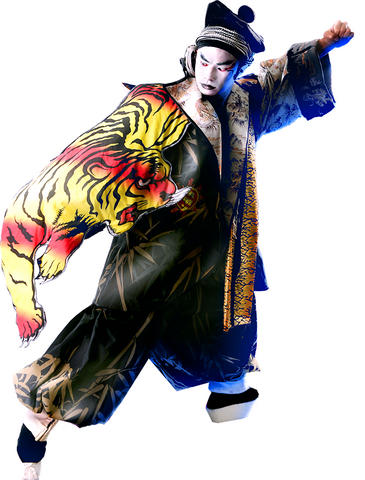Much was expected of the world premiere of 108 Heroes: Tales From Water Margin (水滸108), which opened at the Metropolitan Hall Friday night.
It was going to set the mold for a new kind of contemporary Chinese opera with its bold mixture of tradition and contemporary attitude. Music would range from Beijing opera arias, Mando-pop anthems and even make a short digression into tango. Costumes mixed opera designs with goth, punk, taike (台客) and hip hop. The language would span centuries, with poetry, vernacular storytelling and the most contemporary of modern slang. It had all the potential to be an unmitigated disaster, a hodgepodge that pandered to everyone and pleased no one: But it wasn't. Rough at the edges it was indeed, but so full of vitality and innovation that one could not but overlook most of the flaws and simply applaud the vision and the boldness that brought it to the stage.
Wu Hsing-kuo (吳興國) had set out to make Chinese opera sexy, and with a strong cast of aspiring performers, he pulls off a remarkable coup. With a story like Water Margin (see Taipei Times Friday Oct. 5 for the background), it is no surprise that there are plenty of martial sequences, and this gives the young cast a chance to show off their physical prowess. With fight choreography that draws inspiration from John Woo's (吳宇森) aesthetics of violence and the action of the Street Fighter series of video games, there is plenty there to hold the eye, but Wu manages to insert some fine operatic arias as well.

PHOTO: COURTESY OF CONTEMPORARY LEGEND THEATER
What has been created is unashamed spectacle; great entertainment that manages to avoid triviality by having a script by Chang Ta-chun (張大春), who wrote some gorgeous lyrical passages and manages most of the transitions between traditional and contemporary language with a light touch. For foreign audiences, the presence of English subtitles is a mixed blessing, as they have something of the uneven quality that made Hong Kong B-movies so unintentionally amusing. But with so much going on on-stage, it is hard to take your eye off the action to focus for long on the text.
While all the cast are good, Lin Chao-hsu (林朝緒), who specializes in clown roles, is notable. He shows himself a master of physical theater, and though drawing on the foundation of opera training, clearly has a much wider range. His performance as a midget is astonishing purely for its physical demands, and he can be watched from beginning to end with pleasure without reference to the dramatic action. Chien Yu-shan (錢宇珊) gives taimei (台妹) a new dimension with her body paint and kimono-esque outfits. Some wardrobe malfunctions remain to be ironed out, but the occasional unintended loss of wig or tripping over the voluminous robes while performing some stunning acrobatic feat hardly registered as the audience cheered the audacity of the performers, who were never once disconcerted by these small mishaps.
This is definitely something that anyone with interest in Taiwanese theater, whether traditional or contemporary, should make an effort to see. Although the short three-day run finished yesterday, the show will be staged on Dec. 28 at Hsinchu's National Chiao Tung University (國立交通大學). Given the positive reception the premiere received, it is likely to go on tour in the not-too-distant future.

Following the shock complete failure of all the recall votes against Chinese Nationalist Party (KMT) lawmakers on July 26, pan-blue supporters and the Chinese Communist Party (CCP) were giddy with victory. A notable exception was KMT Chairman Eric Chu (朱立倫), who knew better. At a press conference on July 29, he bowed deeply in gratitude to the voters and said the recalls were “not about which party won or lost, but were a great victory for the Taiwanese voters.” The entire recall process was a disaster for both the KMT and the Democratic Progressive Party (DPP). The only bright spot for

As last month dawned, the Democratic Progressive Party (DPP) was in a good position. The recall campaigns had strong momentum, polling showed many Chinese Nationalist Party (KMT) lawmakers at risk of recall and even the KMT was bracing for losing seats while facing a tsunami of voter fraud investigations. Polling pointed to some of the recalls being a lock for victory. Though in most districts the majority was against recalling their lawmaker, among voters “definitely” planning to vote, there were double-digit margins in favor of recall in at least five districts, with three districts near or above 20 percent in

From Godzilla’s fiery atomic breath to post-apocalyptic anime and harrowing depictions of radiation sickness, the influence of the nuclear bombings of Hiroshima and Nagasaki runs deep in Japanese popular culture. In the 80 years since the World War II attacks, stories of destruction and mutation have been fused with fears around natural disasters and, more recently, the Fukushima crisis. Classic manga and anime series Astro Boy is called “Mighty Atom” in Japanese, while city-leveling explosions loom large in other titles such as Akira, Neon Genesis Evangelion and Attack on Titan. “Living through tremendous pain” and overcoming trauma is a recurrent theme in Japan’s

The great number of islands that make up the Penghu archipelago make it a fascinating place to come back and explore again and again. On your next trip to Penghu, why not get off the beaten path and explore a lesser-traveled outlying island? Jibei Island (吉貝嶼) in Baisha Township (白沙鄉) is a popular destination for its long white sand beach and water activities. However, three other permanently inhabited islands in the township put a unique spin on the traditional Penghu charm, making them great destinations for the curious tourist: Yuanbeiyu (員貝嶼), Niaoyu (鳥嶼) and Dacangyu (大倉嶼). YUANBEIYU Citou Wharf (岐頭碼頭) connects the mainland